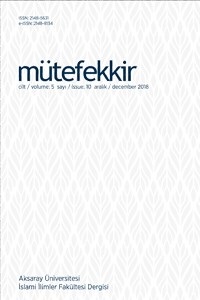Öz
Bu çalışma Peygamberlerin sıfatlarından olan ismet inancının Kur’an yorumlarını nasıl etkilediğini Hz. Âdem kıssası örneğinde incelemeyi amaçlamaktadır. Kur’an’ın yorumuna etki eden âmillerden birisi de İslam düşüncesinde yer alan ‘ismet’ sıfatıdır. Siyasi temelli olarak ortaya çıktığı anlaşılan ve daha sonra itikadi konular arasında yer alan ‘ismet’ sıfatı Şîîlere göre imamlarda ve peygamberlerde; Ehl-i sünnet ve Mu’tezile’ye göre ise sadece peygamberlerde bulunması zorunlu bir sıfattır. Kur’an’da peygamberlerin ihlaslı, seçkin, doğru ve daima Allah’a yönelen gibi üstün özelliklerine temas edilmekle birlikte onlar hakkında günah işlememe gibi bir nitelikten söz edilmemektedir; aksine bazı peygamberlerin işlemiş olduğu hatalardan bahsedilmektedir. Durum böyle olmakla birlikte peygamberlerin hata işlediğine dair âyetler, kimi müfessirler tarafından ismet kavramı çerçevesinde yorumlanmaktadır. Bu çalışmada öncelikle ismet sıfatının mahiyetiyle ilgili kelam mezheplerinin düşünceleri de dikkate alınarak giriş sadedinde kısa bir değerlendirme yapılacaktır. Daha sonra ilgili âyetlerin, ilke/itikat olarak benimsenen ismet sıfatı gölgesinde yorumlanması, Hz. Âdem örneği çerçevesinde ele alınacaktır. Bu çalışmanın amacı ismet sıfatı bağlamında ilgili âyetlere yaklaşım olduğu için, kıssaların gerçekliği, tarihselliği ve mitolojik unsurlar içerip içermediği konuları üzerinde durulmayacaktır.
Anahtar Kelimeler
Öz
This article is about examining the effect of innocence (being free from sin), one of the attributes of prophets, on interpretations of Qur’an. One of the factors that effect Qur’an interpretations is the title ‘innocence’ which exists in Islamic belief. The title ‘innocence’, which is known to have come to existence in political-based topics and then appeared in theological matters, is an attribute that is one of the mandatory features for prophets and imams in Shiah belief. On the other hand it is a mandatory feature for only prophets in Ahl al-sunnah and Mu‘tazila belief. In Qur’an, while it is being addressed to prophets’ supreme features such as sincere, privileged, honest, faithful and so on, it does not mention anything about being free from committing sin. On the contrary mistakes of some prophets are told in the Qur’an. And yet some scholars have interpreted the related verses by innocence principle. In this study, a brief assessment about the nature of innocence title will be primarily done by taking opinions of different word madhabs/sects into consideration. Then, interpretation of the related verses pursuant to innocence title that is adopted as a principle/belief will be discussed in the scope of Prophet Adam example. As the aim of this study is about the approaches to relevant verses in the frame of innocence title, it is not going to be emphasized on the reality, historicity, and mythological elements of the parables.
Anahtar Kelimeler
Ayrıntılar
| Birincil Dil | Türkçe |
|---|---|
| Bölüm | Araştırma |
| Yazarlar | |
| Yayımlanma Tarihi | 31 Aralık 2018 |
| Gönderilme Tarihi | 30 Ekim 2018 |
| Yayımlandığı Sayı | Yıl 2018 Cilt: 5 Sayı: 10 |
Aksaray Üniversitesi İslami İlimler Fakültesi dergisi Mütefekkir, her yılın 15 Haziran ve 15 Aralık tarihlerinde olmak üzere basılı ve online olarak yayınlanan, uluslararası akademik ve hakemli bir dergidir.


